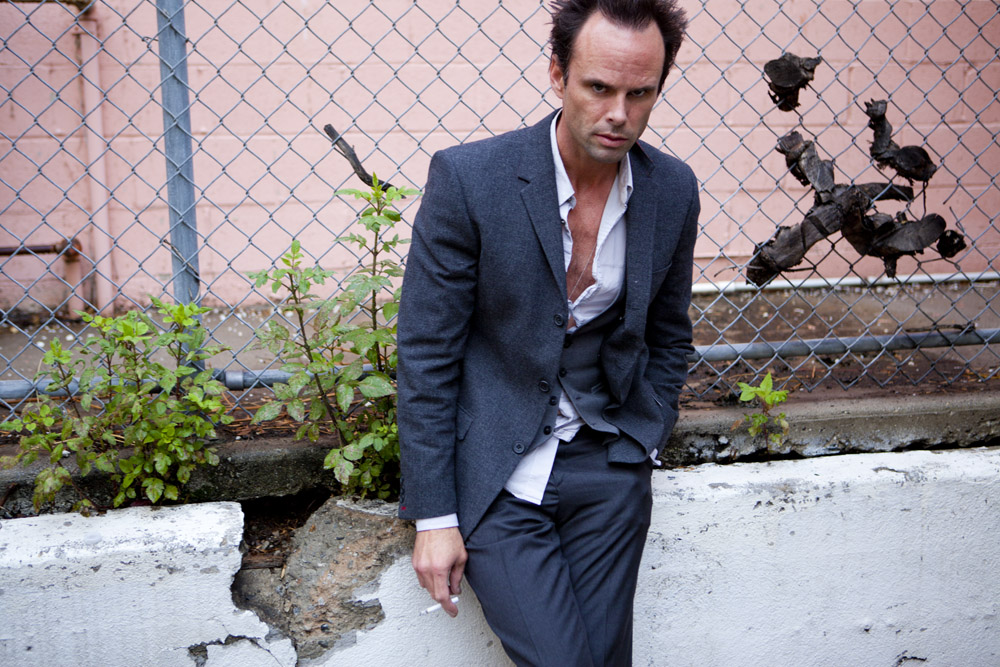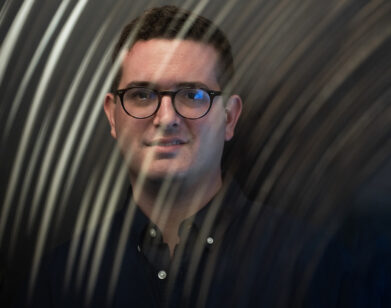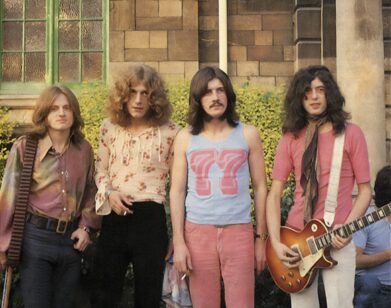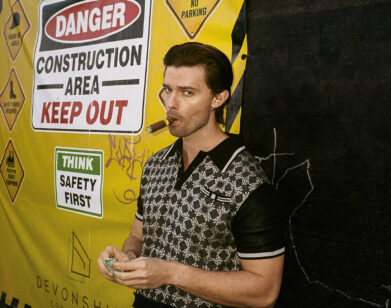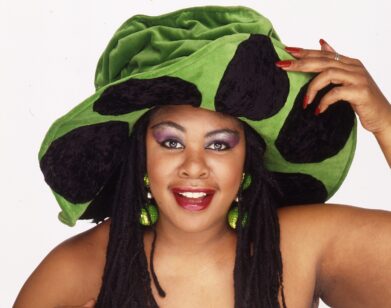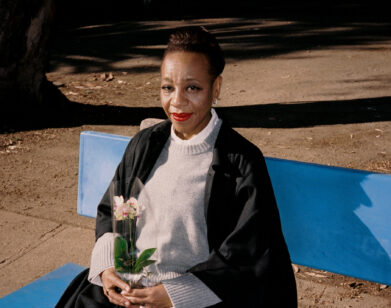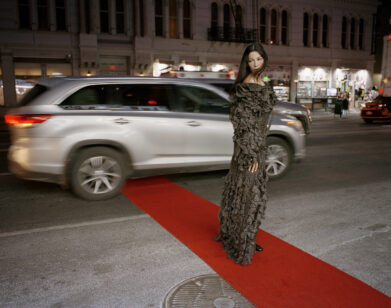Walton Goggins’ Unchained Melody
Arriving at the Ritz bar, Walton Goggins is already in full conversation with the Southern-sounding woman next to him—a stranger. The woman doesn’t know who Goggins is, or if she does, she’s doing a pretty good job at hiding it. Instead, the two are exchanging stories about their children; Goggins’ son is not quite two. “I was here with my son for the first time in August,” Goggins explains. “It was warm, beautiful, and we were feeding the ducks in the pond right across the street. I’m looking at the same pond, I’m looking right where I stood with him, and I’ve stood for the last 15, 20 years, or whatever, and for some reason now it feels really empty. I’m lonely.”
Goggins has made a career of playing characters whom you might generously describe as “morally problematic.” The Shield‘s corrupt cop (and corrupt friend), Shane Vendrell, and Justified‘s somewhat reformed white supremacist, Boyd Crowder, are his most famous roles. Somehow, with his impish grin, Goggins steers these characters away from being outright villains. You don’t want Boyd Crowder to die—no meager acting, considering the character has a swastika tattooed on his arm.
In Quentin Tarantino’s new film, the Spaghetti southern Django Unchained, Goggins plays Billy Crash, a dirty cowboy and employee of childish plantation owner Calvin Candie (played by Leonardo DiCaprio), who nearly castrates Jamie Foxx’s character, Django.
EMMA BROWN: Quentin Tarantino seems so energetic. I can’t even imagine being around him every day.
WALTON GOGGINS: I hate to use this as a metaphor, but making movies is kind of like going to war. It’s not—but the stamina required and what it takes to tell a story that is this big in scope, you need a general that will bring out the best in you. And that’s what Quentin did for us, and has done for so many other actors.
BROWN: Does he ever have an off day—where he’s kind of quiet?
GOGGINS: Never. No. There are days where he’s more vocal than others. But the days where he’s not as vocal, I think he’s just taking the time to figure out what he needs from this particular scene. There were days where it was really difficult for all the actors. One day in particular for me was this kind of torture scene with Jamie [Foxx], which was much longer than how it is in the film. It took us five days to do it, between Sam [Samuel L. Jackson], and myself, and Jamie. It was emotionally very tough to deal with, looking at a man [Jamie Foxx’s character, Django] strung upside down, and taking his manhood, his ability to spread his seed, in my hand and literally terminating him—his lineage—which is what slavery did to so many people. It was really, really difficult, and Quentin was very, very respectful, and it was as hard for Jamie there, being hung up, as it was for me. I’m a liberal guy that lives on the West Coast—I hardly eat meat, much less castrate people. And there was one particular moment where it was just like, “Let’s do it. Let’s do this. Let’s do it right. Let’s do it for all the people this fucking happened to.” Afterwards, we were at a dinner and just kind of talking about it, kind of letting that experience wash all over us, and I just remember being so grateful for having had that experience. And participating in the retelling of that experience.
BROWN: Was the prospect of that scene hanging over your head when you first met Jamie?
GOGGINS: Yeah, there were a couple of scenes that wound up not making it into the movie that were hanging over my head—it was actually something that I was looking forward to. As an actor, it’s like having a scene where you make love to a woman, a leading lady, and for me, I’m pretty shy when it comes to that. In some ways I try to overcompensate by being friendly, and then my other modus operandi is to go the other way and not say anything—say nothing. With Jamie, he was gracious enough, and very, very supportive, to really reach out; and we became friends, which, contrary to what I normally think, made that scene better. Because I knew that we were in a realm of Quentin Tarantino pretend and this was out of the imagination of Q.T., it wasn’t something that personally Walton Goggins and Jamie Foxx were participating in. So, yeah it was good. He’s a really good man.
BROWN: Jamie has to go through a similar thing when he tells Dr. King Schultz not to buy—and thus not to save—Calvin Candie’s runaway slave D’Artagnan.
GOGGINS: Witnessing something like that, absolutely. Not to mention the actor playing D’Artagnan and all the other African-American actors who were there as slaves, watching that. In those moments when it got that heavy, Jamie would look to Quentin or speak to the sound guy, and say “Okay, I need my music.” And then they would start playing some rap—some kind of really black empowering music, to just even the playing field. And Quentin had set up this protocol for those moments that were very tender, and very real, and very raw: he would play the music to kind of balance that out. For that particular scene that you are talking about, Jamie said “I need my shit. I need to hear it,” and then they put on Notorious B.I.G. And it made it easier for all of us.
BROWN: That’s so interesting. Did you sit down and talk about it beforehand—did you know Quentin was going to do that?
GOGGINS: Whenever you show up on a set where you haven’t been from the beginning—at least myself—I’m kind of quiet. I just watch the politics and how everything unfolds. It’s kind of like going to a new high school. You want to see who everyone is before you introduce yourself, really, to kind of make friends. I think any smart person does that in social situations. So I just kind of watched, and listened. And I was grateful to be invited to the party, and given the opportunity—while some of it wasn’t reflected in the final cut—but I was really given the opportunity to work side by side with some of my heroes. And Quentin being foremost among them.
BROWN: Obviously some actors in the film, like Samuel L. Jackson, have worked with Tarantino many times before, whereas Jamie and Leonardo never have. What was the dynamic like between Tarantino and his veteran actors?
GOGGINS: I think there was a shorthand. But I don’t think you work with Quentin Tarantino for very long before developing a shorthand. He had it with Sam coming into this experience, and I saw him have it with Leonardo, and with Jamie, and myself. And you knew that Quentin had very specific choices that are things that he wanted you to explore. Quentin is militant about exploration. That’s one of the highest compliments I could give anyone. He’s militant in his curiosity, and his not having all the answers when he sets out to do something.
BROWN: How does that actually affect you? Do you do a scene many different ways?
GOGGINS: Many different ways. I think that what comes from having that attitude in life is that you have a certain amount of expectations, but they’re very small, which allows the experience to kind of dictate a reaction that comes maybe two or three days later. I think Quentin enjoys the process much more than the final destination.
BROWN: Well, that makes sense if you watch his movies.
GOGGINS: I think so, yeah. I know that Quentin’s a fan of Elmore Leonard, and being [on] a television show that was generated from Elmore’s imagination, I really see the similarities that I could only see superficially before. These are men who can thread the needle between the horrific and the absurd, make you laugh while giving you a dose of extreme violence. And very few people have that capability.
BROWN: How did you get involved? Did Quentin approach you?
GOGGINS: Yeah, we met at a barbeque that was set up by a mutual friend of ours who said, “You need to meet. You’re perfect for him. He’s going to love you.” Then I went in, and talked with him about a few different things, and this one particular role—Billy Crash. It was something that was really kind of funny, and one-dimensional. Then the opportunity to play Ace Woody came along and Ace Woody kind of got absorbed under the umbrella of Billy Crash.
BROWN: Was Ace Woody originally Kevin Costner?
GOGGINS: Kevin Costner. Then he was Kurt Russell. [Then], as fate turned out, it was me.
BROWN: You’ve played several characters—on The Shield and in Justified—who are both very likable and do terrible things. Do you feel like you have to prove that you’re not this terrible person when you first meet people?
GOGGINS: [laughs] Well, hopefully I don’t have to prove it, because I don’t think I’m a terrible person. So hopefully it just takes a couple of minutes talking to me to see that I’m not that guy. And an actor that tells you that they have real choices between material is, for the most part, lying. There are very few people that have opportunities. But what you do have where I am in my career, is saying no to the things that seem repetitious. For me, I always look for material that allows me to bring my worldview to it. And those opportunities, since the beginning of The Shield, have grown exponentially.
BROWN: I know you’ve produced a few things; would you ever want to write?
GOGGINS: You know, I’m a very good editor and I feel like I’ve been given an opportunity to be a storyteller four times. Starting with a short film that we did [The Accountant].
BROWN: That won…
GOGGINS:… an Academy Award; yeah, that’s right. Then three films that we did—a movie called Chrystal and a movie called Randy and the Mob and a movie called That Evening Sun. I’m as proud of them as anything I’ve ever been associated with. I think they’re all very unique and flawed and perfect. I love them. I like storytelling, and I feel more confident as the years have gone on about my ability to do that. I have another movie that I want to do with my wife, oddly enough, sometime over this next hiatus.
I have another show that I’ve sold recently, that I’ve been working on for a couple of years [Gringo]. It’s about something that I’m extremely passionate about: exploring other cultures, how Americans are perceived by other cultures and how we perceive other cultures through our worldview. I travel whenever I get an opportunity to do so, and I think this country is ready for a show on television that is bilingual and really puts front and center another culture, both as the protagonist and the antagonist. In my particular show I really want the American to be a part of the problem as much as a part of the solution. It’s Graham Greene in a sense—a person who is really dropped in a situation where he doesn’t really understand the culture, much less the language, and he’s forced to deal with that.
BROWN: It can be difficult to talk about an “American” experience—there is such a difference between New York and…
GOGGINS: Oh my God, yeah. Sadly, in this country—maybe this is in the history of the world, really—it’s the urban experience versus the bucolic experience. And it is different, but therein lies the slow progression of democracy. We are a melting pot. I mean, Los Angeles alone has more practicing religions then any other place in the world—in one city. That’s a population of almost 14 million people.
BROWN: Is the first show you were ever on Beverly Hills, 90210?
GOGGINS: Hey, whoa, whoa, wait a minute. Yeah, it was—no, actually, it was In the Heat of The Night with Carroll O’Connor. But, yeah I’m not above playing a SEAL for a cultural iconic hit like 90210. Who wouldn’t do that? At the time I remember meeting Jason Priestley—this was when I was 19 or 20 years old—and just my hand shaking when I asked him, “Can I please have my picture taken with you?” [laughs] Please, Tori Spelling, are you kidding me? And I remember taking that photo and having it in my pocket and having it with me for the longest time, because you felt like, “Wow I just had a little slice of pop culture in this country,” and it was cool, and it was great.
DJANGO UNCHAINED IS NOW PLAYING.

